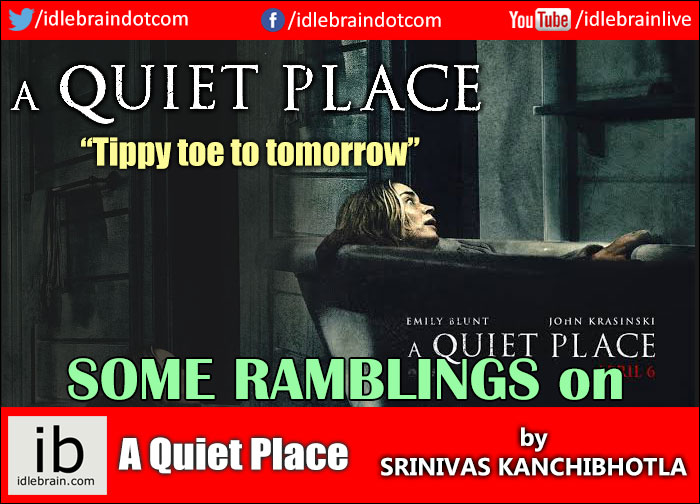
A tight knit family of four, somewhere in the middle of America, finds itself in the throes of an alien invasion. Cut off from the rest of the world and left to their own devices (quite literally) to fend for themselves, the family bands together surviving on their wits, luck, and importantly, discipline. The movie is not so much about the aliens as it is about the family itself counting off the seconds, minutes and hours till the next day marking off another day of successfull survival on the blue planet. M. Night Shyamalan's "Signs" was about as tightly contained and localized feature as one could get about alien invasions, in it, the invasion is, how Hitchcock would put it, a "Macguffin" (an unimportant thing that is only vital to the narrative), with the real meat on the bone being the way the characters react to this external aggression. The alien invasion in the story above could just as easily be substituted with an occupation by a foreign country, or a crackdown by one's own regime, and the movie would play out in just the same way (recall the introduction scene of Nazis sniffing for the hidden jews in "Inglorious Basterds"). News pouring out from war ravaged Syria, a country that has been caught in the crossfire between an oppressing regime and a recalcitrant militia for more than 7 years now, not just about the exploding mortars, clockwork airstrikes, caved roofs and destroyed dwellings, but also about cakeless birthday parties in those same razed down houses with zero power and little running water, wedding receptions held in hushed tones and muted celebrations, (and the most perplexing of all) child deliveries that still happen in the most unhygenic of conditions with the help of experienced midwives, all point to the simple fact that regardless of the crushing weight of the conditions around, life still manages to slither away through the cracks. One of enduring images of the war photography involves parents clutching their infants close to their chests and bolting from the war zones, with the parents faces painted in hues of varied horror and the infants, serenity personified, never safer than in the tight warm embrace of their creators. Be it war photography or cinematography, it is this all too natural-ness carved out of a scary relief that captures the true face of horror (like the little girl in the red dress who keeps walking around aimlessly during the height of ghetto liquidation in "Schindler's List").
Alien Invasion? Foregin Aggression? One's own regime's Oppression?, survival is always about trying to beat the odds, and "A Quiet Place" understands this very well. Everything about it, its running time, its economy with words, and even the measured footsteps of the characters, is very calculated and precise. It rarely spends (wastes) time with exposition nor wallow in its predicament. A feature about alien invasions can go two ways. One, the Roland Emmerich way, the master of mega(lomaniacal) destruction, where the movie is all about the eye popping ways in which earth can be nearly annihilated to oblivion. And the second is the Shyamalan kind, where even super heroes have trouble keeping their marriages in tact or have the kids tow the lines of their omnipotent dads. Herein, the focus is entirely on the family, regardless of the turmoil around. Needless to say, it is the latter that holds the interest than the sight of Washington Memorial coming down in great ear splitting detail for the (n+1)th time. Krasinski, thankfully, sticks with this road less travelled, with minimal graphics, and fewer jumpy moments, and spends most of the time ratcheting up the tension one turn at a time to near unbearable levels. That, despite the apocalyptic setting if the family still finds time to do its laundry, say grace at the dinner table, welcome a new baby in a few days, they are much more than plot devices or contrivances (though there is one particular one involving a nail in plain view, that propels the narrative to the climax, which runs antithetical to the otherwise meticulous meticulous nature of the family of not leaving any loose ends), these acts hope to create a semblance of normalcy amid a world that is fast bearing down (refer to the Syrian situation above). In this sub-genre of minimalistic expression in the face of certain extinction, 'A Quiet Place' strides confidently (on its toes, of course) and takes it rightful place near the head of the table.
P.S. For a man who has built his career on silent stares and making faces at the camera (in the US version of "The Office"), it is only fitting that John Krasinski helm this feature about stares, glares and whispers.
checkout http://kanchib.blogspot.com for Srinivas's Blog.
